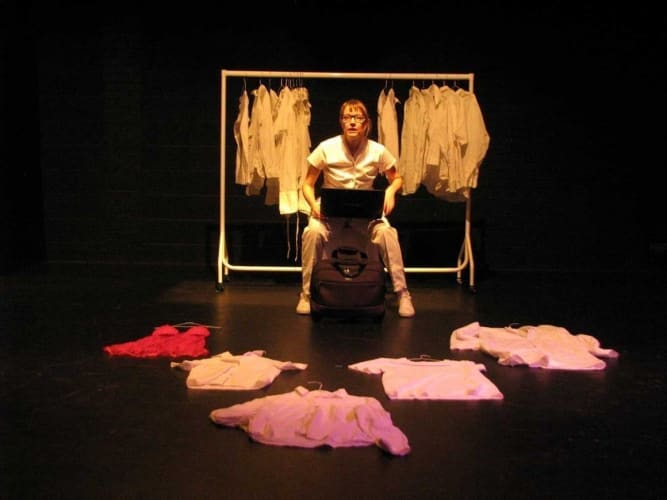In this intense and confrontational solo piece, performer Adie Mueller and director Mike Carter have crafted a new version of E T A Hoffmann’s gothic novella The Sandman (1816) which transplants the original story from the early 19th century to the present day.
Nowadays, Hoffmann is probably best known through the other artworks his fantasy stories have inspired, such as Offenbach’s opera The Tales of Hoffmann (1881) and Tchaikovsky’s ballet The Nutcracker (1892). But Hoffmann’s name also survives due to his association with the father of psychoanalysis Sigmund Freud. In his 1916 essay "The Uncanny", Freud discusses The Sandman in order to explore the sense of strangeness we often encounter when the familiar mingles with the unfamiliar.
Rather than adopt a linear approach to Hoffmann’s text, Mueller and Carter have chosen to tell the story in a fragmented, non-chronological way. This means that, while there are brief moments of lucidity throughout the production, for the most part the audience is forced to make sense of the disjointed pieces that make up this strange and perplexing puzzle.
Over the course of 70 minutes, we learn that the central protagonist Nathaniel has a deep-seated fear of the Sandman: he believes that this usually benign figure wants to steal his eyes and feed them to his monstrous offspring. As a child, Nathaniel and his sister Clara dine with their parents and a sinister family friend named Coppelius, whose disgusting table manners and monstrous appearance forces Nathaniel to conflate him in his mind with the dreaded Sandman. When the young boy witnesses his father and Coppelius engaged in a bizarre experiment, he is traumatised by the event and loses his grip on reality.
Overall, I found this production deeply frustrating and uninvolving. Although The Sandman was written within two years of Mary Shelley's Frankenstein (1818), it has not entered the public imagination to the same degree and its plot will be unfamiliar to most audience members. By adopting such a complex approach to an obscure text, Mueller and Carter make it near-impossible for the audience to engage with the story and its characters. Furthermore, the lack of storytelling clarity means that some of the play’s ostensible themes—sexual politics in the digital age and the relationship between humans and robots—are not really explored in any meaningful way.
I was also perplexed by several elements of the staging. For example, over the course of the production, Mueller moves items of clothing from a clothes rack and lays them out on the floor, but her reason for doing so remains unclear. I was also discomfited by some of the production’s more sexual moments, which seemed merely like calculated attempts to shock the audience.
On the plus side, Mueller gives a confident and committed performance throughout, fully embracing the physical demands of the piece. Due to the fragmented nature of the play, it is not always clear which character she is playing, but some of her characterisations are particularly vivid. Her performance as Coppelius, for example, is especially hair-raising and gruesome.
